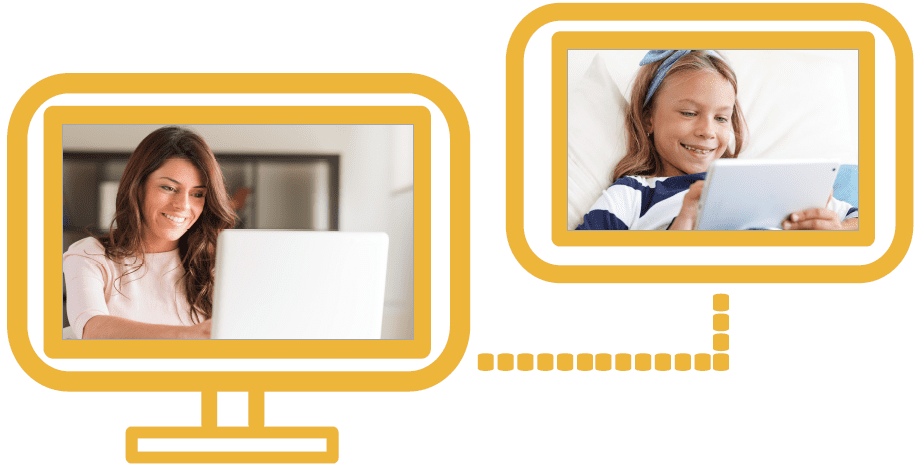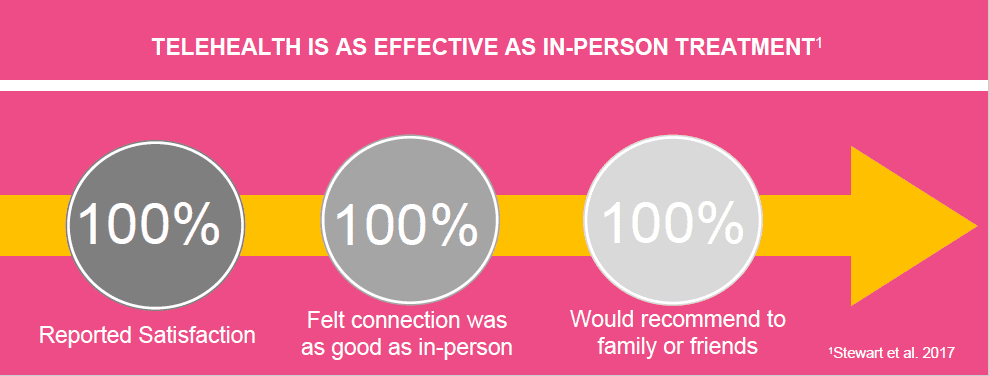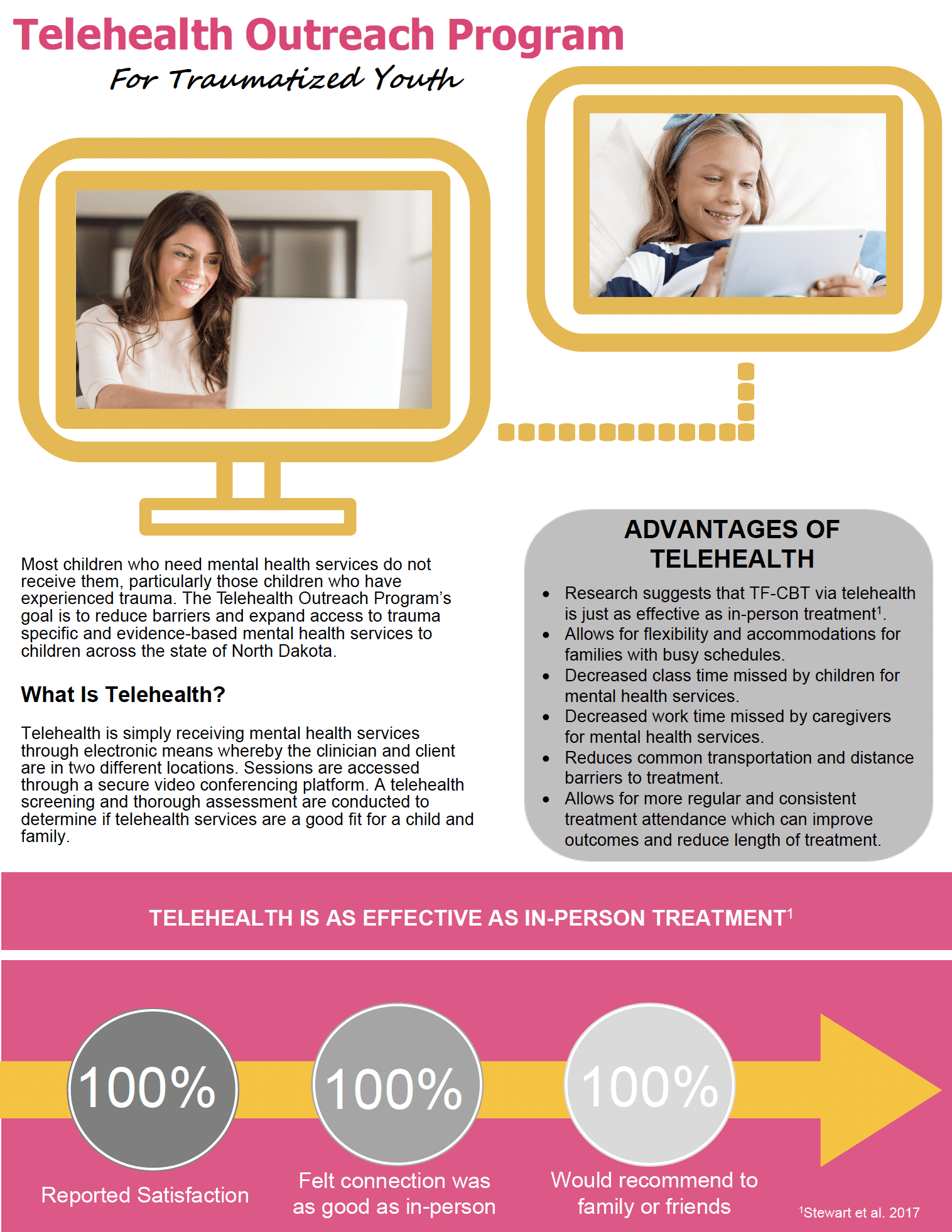Reducing Barriers and Expanding Access
Most children who need mental health services do not receive them, particularly those children who have experienced trauma. The Telehealth Outreach Program’s goal is to reduce barriers and expand access to trauma specific and evidence-based mental health services to the children and families we serve.

Advantages Of Telehealth
- Research shows that TF-CBT via telehealth is just as effective as in-person treatment.
- Allows for flexibility and accommodations for families with busy schedules.
- Decreased class time missed by children for mental health services.
- Decreased work time missed by caregivers for mental health services.
- Reduces common transportation and distance barriers to treatment.
- Allows for more regular and consistent treatment attendance which can improve outcomes and reduce length of treatment.


Telehealth Services
At the Dakota Children’s Advocacy Center we provide evidence-based trauma treatment for children and families exposed to various traumas such as sexual abuse, physical abuse, domestic violence, community violence, human trafficking, and neglect. Therapy services through the Telehealth Outreach Program at the Dakota Children’s Advocacy Center are provided at no cost to the child or family. Our clinicians have been trained in how to adapt evidence-based trauma treatment models to be delivered with fidelity via telehealth. Currently we provide the following evidence-based trauma treatments through the Telehealth Outreach Program:
Trauma-Focused Cognitive Behavioral Therapy (TF-CBT; Cohen, Deblinger & Mannarino, 2004) is an evidence-based treatment for children ages 3-18. TF-CBT integrates cognitive behavioral techniques with trauma-specific interventions. The model has been researched in numerous randomized clinical trials and is considered the Best Practice model for reducing traumatized children’s emotional and behavioral problems. Research through the Medical University of South Carolina suggests that TF-CBT is as effective when delivered via telehealth as in-person. Telehealth TF-CBT is recommended for children ages 7 and older. Through the Telehealth Outreach Program TF-CBT can be delivered via telehealth at families’ homes or schools. Children and families who receive TF-CBT meet weekly with a therapist, both individually and jointly. The treatment typically lasts 12-20 sessions.
(AF-CBT) is designed to improve the relationships between children and parents/caregivers in families. It is most suitable for school-aged children (age 5-17) who exhibit some level of behavioral or emotional dysfunction, and for caregivers who may resort to uncomfortable or unsafe levels of physical coercion, harsh punishment or hostile exchanges. Two randomized trials have shown it to be superior to routine community care (generalized counseling) for reducing children’s conduct and oppositional behaviors, as well as in reducing internalizing symptoms. Further, parents who receive AF-CBT demonstrate significantly greater decreases in the use of physical discipline and in anger at post-treatment as compared to those in routine community care.
CFTSI an evidence-based treatment for children between the ages of 7-18 and a caregiver. CFTSI is a short-term, early intervention model that must begin within 45 days of a potentially traumatic event or disclosure of abuse. Families typically complete CFTSI within 5 to 8 sessions.
Cognitive Processing Therapy (CPT) is an evidence-based, weekly treatment for post-traumatic stress disorder (PTSD) that helps adult persons recognize how trauma has changed their view about themselves, others, and the world. Most people who complete CPT show a noticeable improvement in PTSD symptoms.
CPT can be used for caregivers who have experience their own trauma or are experiencing secondary trauma from reliving what has happened to their child.
(PCIT) is an evidence-based treatment for young children with emotional and behavioral disorders that places emphasis on improving the quality of the parent-child relationship and changing parent-child interaction patterns. Children and their caregivers are seen together in PCIT. Most of the session time is spent coaching caregivers in the application of specific therapy skills. Therapists typically coach from an observation room with a one-way mirror into the playroom, using a “bug-in-the-ear” system for communicating to the parents as they play with their child. Concluding each session, therapist and caregiver together decide which skill to focus on most during daily 5-minute home practice sessions the following week.
(PSB-CBT) is an outpatient group treatment for school-aged children (and their parents) who have engaged in problematic sexual behaviors. Research has shown that families that participate in PSB-CBT are less likely than the general population to reoffend. This is extremely important not only for the kids and the families that we serve but also to the community in general because of this decreased risk. PSB-CBT is appropriate for school age kids (ages 7 – 13) and their non-offending parents.
(SPARCS) is an innovative treatment for youth who have experienced traumatic or stressful events. The goal is for youth to learn skills to regulate emotions, problem solve, communicate with others, and boost resiliency in the face of high levels of ongoing stress.
FAQ Telehealth Treatment
Telehealth is simply receiving mental health services through electronic means whereby the clinician and client are in two different locations. Sessions are accessed through a secure video conferencing platform. A telehealth screening and thorough assessment are conducted to determine if telehealth services are a good fit for a child and family.
Mental health services are delivered through a secure video conferencing platform between the clinician, child, and family. This is set up by the CAC.
Screening
Assessment
Treatment
Telehealth services are available for children ages 7 -18.
Eligibility for the program will be determined at assessment.
A laptop, computer, or tablet with internet connection is required to connect to telehealth services. If you do not have one, equipment may be available for loan from the CAC. The secure video conferencing system is cloud based, with point to point encryption which meets HIPAA criteria for privacy. Platforms such as Skype and FaceTime are not considered secure.
Telehealth services need to take place in a secure, private setting to ensure confidentiality. Services can take place in the home, at school, or another community agency. For safety, a designated adult is required to be available during the session and this may be verified.
One of the most important predictors of healing after trauma is support from caregivers. Caregivers play an integral role in helping a child heal and ultimately treatment works best when caregivers are involved. A caregiver is required to be present during home-based telehealth services and participate, as needed, in the session. This includes checking in with the clinician at each session, supporting the child, and encouraging practice of skills.

